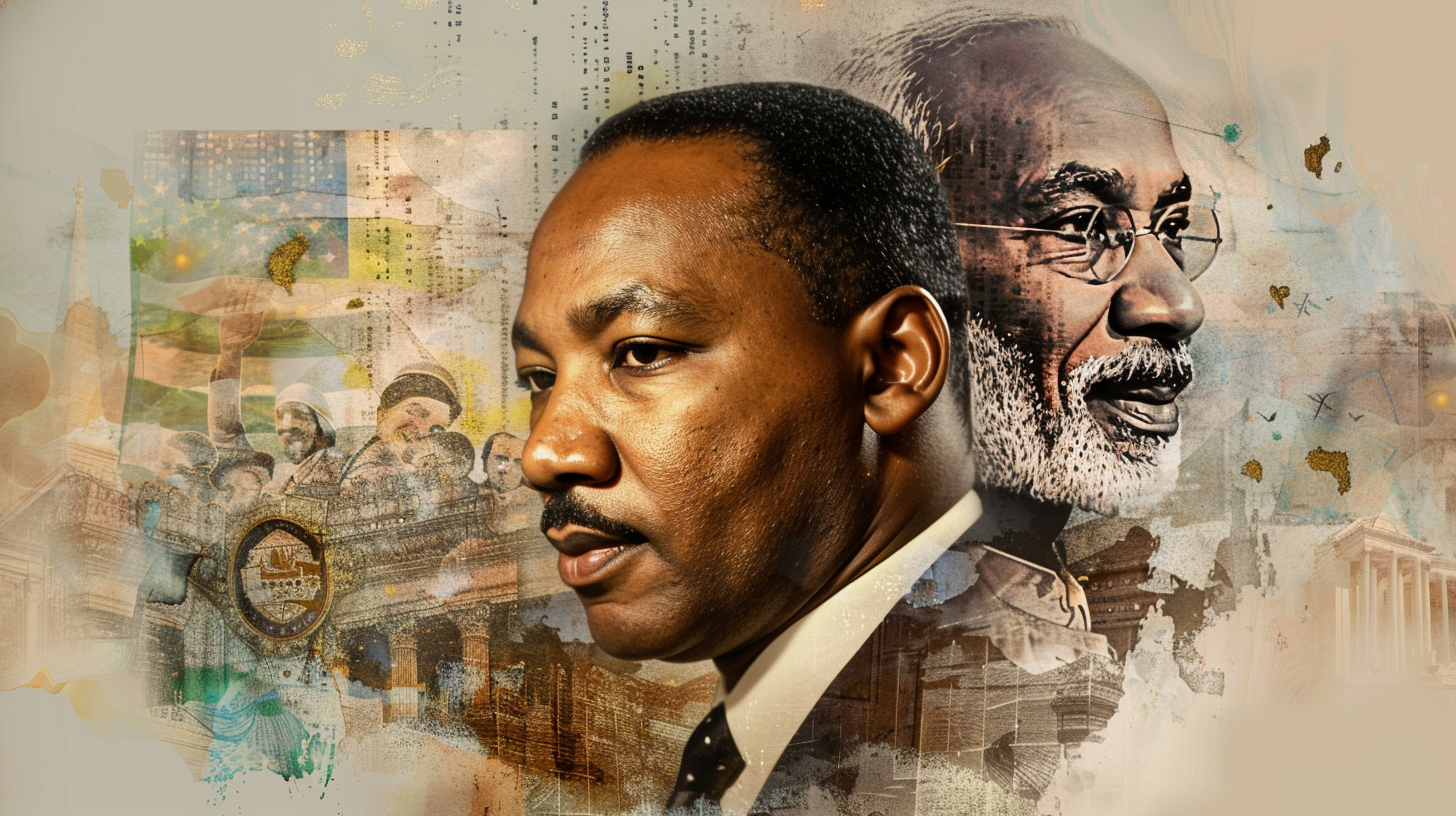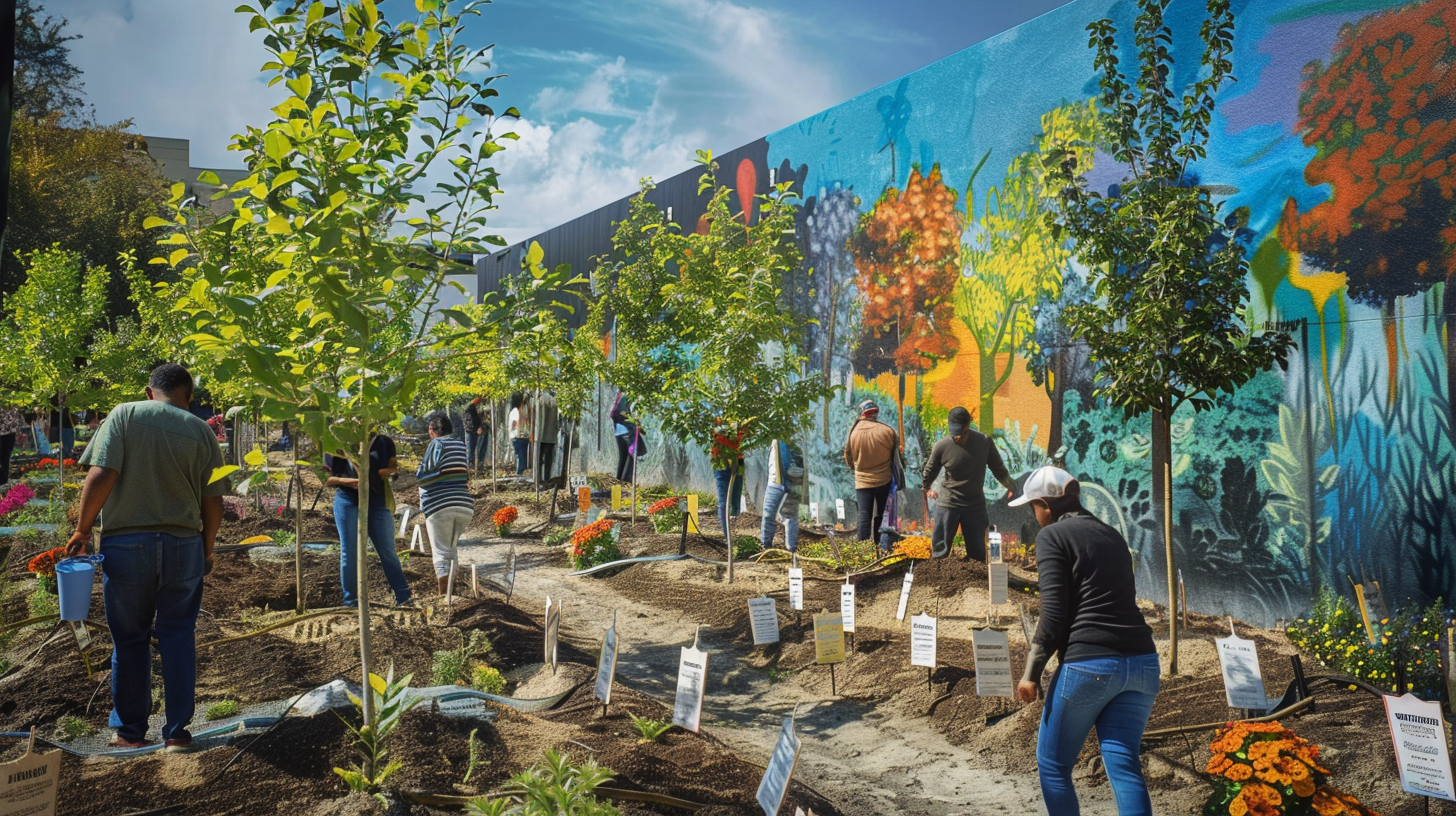Introduction: At the Crossroads of Social Justice and Spirituality

Visualize standing at a crossroads where two powerful forces converge: social justice and spirituality. This is not just a meeting point—it is a fusion where profound transformation begins. Picture Mahatma Gandhi in the early 20th century, his thin, determined frame clad in simple hand-spun cloth, embodying the spiritual discipline of ahimsa (non-violence) as he led India to independence through peaceful resistance. His actions, deeply rooted in spiritual beliefs, not only reshaped a nation but also inspired global movements for civil rights and freedom.
As you journey through this article, you will explore how such intersections of spirituality and social justice are not relics of the past but vibrant, dynamic locales of change today. You will discover how integrating these realms enhances personal growth and fosters a more compassionate and equitable society. This article will delve into both historical and contemporary examples, illustrating how spiritual philosophies have been foundational in championing social causes—from environmental activism inspired by indigenous spiritual traditions to modern movements for economic equity driven by faith-based leaders.
Why does this merger matter? It provides not only a moral compass but also a sustaining force for those fighting for justice. When you connect your spiritual practice with activism, you tap into a deeper well of motivation, one that is replenished not just by the desire for change, but by a commitment to the sacred dignity of all life.
Prepare yourself for a deep dive into how these intertwined paths can lead to transformative outcomes. You will learn how personal and collective transformation is achievable when we harness the virtues of our spiritual traditions to challenge the injustices of our times. The synergy of social justice and spirituality invites you, no matter where you stand on the spiritual or political spectrum, to forge a path that is both righteous and uplifting.
By the end of this article, you’ll see that these two forces, when woven together, create a strong, resilient fabric that can hold the weight of our biggest societal challenges. Let’s embark on this journey together, exploring how we can each be part of this grand weaving.
Defining the Concepts: Social Justice and Spirituality

As you begin to peel back the layers of societal development, you’ll encounter the enduring concept of ‘social justice.’ Rooted in ancient philosophies and moral teachings, social justice has evolved through the ages, its definition expanding as societies have grown more complex. The term itself was coined in the 19th century, but its principles can be traced back to the ethical injunctions of religious and philosophical texts that advocate for fairness and equity among all people.
Throughout history, movements such as the abolition of slavery, women’s suffrage, and the civil rights movement have significantly shaped what social justice means today. These efforts have highlighted the necessity of equitable access to resources, opportunities, and rights, regardless of an individual’s background. In our current context, social justice issues continue to press on the societal fabric, with matters like racial equality, LGBTQ+ rights, and economic disparities demanding attention and action.
Transitioning from the societal to the personal, let’s delve into ‘spirituality.’ Often perceived as a personal journey, spirituality encompasses a broad spectrum of practices and beliefs, ranging from traditional religious observances to secular meditations on purpose and existence. Across the globe, whether in mosques, churches, temples, or forest retreats, spirituality often drives ethical and moral behaviors, shaping how individuals interact with the world and advocate for justice.
In the realm of social justice, spirituality serves as both inspiration and motivation. For instance, Martin Luther King Jr.’s faith-driven advocacy for racial equality or Malala Yousafzai’s spiritually-infused fight for girls’ education illustrate how deeply spirituality can influence social justice initiatives.
To help you visualize this intersection, imagine an infographic mapping the key milestones where spiritual values have historically intersected with social justice movements—such as the fight against apartheid in South Africa or environmental campaigns led by indigenous spiritual leaders today.
As you explore these definitions and visual representations, remember that understanding these foundational concepts is crucial. This knowledge will not only enhance your comprehension of the discussions that will follow in this article but will also prepare you for a deeper exploration of how these two powerful forces—social justice and spirituality—can synergistically work to transform societies. By engaging with this narrative, you’re taking the first step towards appreciating the profound impact of this dynamic fusion on our world.
Unity in Action: Exploring the Intersection of Spirituality and Social Justice
Historical Intersections: The Spiritual Foundations of Social Justice

In the annals of history, few figures stand as vivid exemplars of the intersection between spirituality and social justice like Martin Luther King Jr. and Mahatma Gandhi. These leaders did not just fight for equality and justice; they were propelled by deep spiritual convictions that informed every aspect of their movements.
Martin Luther King Jr., a Baptist minister, infused his pursuit for civil rights in America with profound spiritual rhetoric and biblical themes, emphasizing love and justice as not merely ethical demands but divine commands. One pivotal moment was his leadership during the Montgomery Bus Boycott in 1955, which was as much a testament to his faith as it was a fight for racial equality. King believed that nonviolent resistance, inspired by Jesus’ teachings, was the most powerful weapon against a system built on segregation and hatred.
Halfway across the world, Mahatma Gandhi’s commitment to nonviolence was underpinned by his spiritual practice of Hindu principles, particularly ‘Ahimsa’ (non-harm). Gandhi’s 1930 Salt March, a 240-mile trek to the Arabian Sea to make salt in defiance of British laws, was a seminal act of civil disobedience driven by his belief in the spiritual sanctity of natural rights. For Gandhi, spirituality was not passive but a force for profound societal change.
From these historical beacons, today’s movements can draw crucial lessons. The principles of nonviolence, perseverance, and compassion that guided both King and Gandhi are timeless, suggesting that true social change is often driven by the power of moral and spiritual strength. Integrating these values into current social justice campaigns can enhance their resonance and effectiveness, making the fight for justice not only a political struggle but a profound moral engagement.
Contemporary Practices: Leaders at the Nexus of Spirituality and Social Justice

In the vibrant landscape of modern activism, a diverse array of leaders and organizations stand out for their unique integration of spirituality and social justice. These figures not only advocate for change; they infuse their efforts with deep spiritual convictions, creating movements that resonate profoundly with their communities.
Influential Activists and Their Initiatives
One notable leader is Sister Simone Campbell, a Roman Catholic nun who spearheaded the “Nuns on the Bus” tour to address economic inequality, immigration, and healthcare reform in the United States. Her activism is deeply rooted in Catholic social teaching which emphasizes dignity, solidarity, and the preferential option for the poor. Sister Simone’s approach demonstrates how spiritual beliefs can directly inspire action on pressing social issues, leading to widespread engagement and policy advocacy.
Similarly, Rev. William Barber’s “Poor People’s Campaign” revitalizes Martin Luther King Jr.’s legacy by tackling the interconnected issues of poverty, racism, and environmental destruction. Rev. Barber uses his spiritual leadership to galvanize support, relying on biblical teachings to foster a moral revival across communities.
Strategies for Spiritual Integration
These leaders often employ specific spiritual strategies to enhance their social justice efforts. Meditation and prayer, for example, are used not only for personal grounding but also as tools for community resilience and solidarity. In gatherings, moments of silence or guided prayers lead by figures like Rev. Barber provide spaces for reflection and strengthen the collective resolve.
In addition to personal spiritual practices, these activists incorporate spiritual narratives into their public messaging, making the case that social reform is not only necessary but a moral imperative. This approach has proven effective in broadening their movements’ appeal, reaching people of various faiths and backgrounds who share common values.
Sadhguru on Transformation: Unveiling the Spiritual Influence on Social Justice
Psychological and Societal Impact: The Transformative Power of Spirituality in Social Justice

Engaging in social justice activities that are rooted in spiritual values can profoundly affect both personal growth and community development. This integration often leads to a deeper sense of purpose, enhanced empathy, and a strengthened commitment to advocacy, all while fostering significant community cohesion.
Personal Growth through Spiritual Activism
Consider the story of Maria, a young activist involved in urban environmental justice projects. Maria’s commitment to these causes is deeply influenced by her spiritual beliefs in stewardship and compassion, rooted in her Buddhist practices. Through her involvement, Maria has developed not only a greater understanding of environmental issues but also enhanced empathy for those in her community affected by pollution and neglect. Her spiritual practices, including mindfulness and meditation, have helped her maintain resilience in the face of challenges, empowering her to continue her advocacy with vigor and patience.
Community Impact of Spiritual Values
On a broader scale, spirituality can galvanize communities to come together for common causes. A compelling example is a small town in South Dakota where community members, guided by Native American spiritual principles, rallied to protect their local water sources from industrial pollution. Their shared spiritual convictions about the sacredness of nature fostered unity and cooperation among a diverse group of residents, enhancing their collective efficacy. The town’s efforts not only led to legislative changes but also strengthened community bonds, with members continuing to engage in regular community dialogues and joint actions.
Story of Transformation
Engaging in spiritually-informed social justice initiatives not only nurtures personal growth but also catalyzes profound community transformation. This impact is vividly demonstrated by the work of “Our House,” a faith-based organization in Atlanta that addresses homelessness by tackling its root causes: lack of child care, education, and employment skills among parents.
Founded on a coalition of faith-based principles, Our House began by addressing the urgent needs of homeless new mothers and their infants. It has since expanded to offer year-round, free childcare, comprehensive family support services, and a credential-earning job training program. These services are designed not just to provide temporary relief but to equip individuals with the tools needed for long-term stability and independence. Over the years, Our House has transformed the lives of thousands, illustrating the lasting impact that comes from integrating spiritual care with practical support (Our House).
Challenges and Controversies in Merging Spirituality with Social Justice
Integrating spirituality into social justice initiatives is not without its critiques and challenges. Some activists express skepticism regarding the inclusion of spiritual elements in public activism. They worry that spiritual rhetoric might dilute the urgency of social justice issues or alienate those who do not share the same spiritual beliefs. This concern highlights the delicate balance between maintaining a movement’s momentum and broadening its inclusivity.
Another significant challenge is managing personal beliefs within the public sphere of activism. Activists often face the difficult task of keeping their spiritual practices authentic while engaging in diverse social movements. This situation becomes even more complex when personal spiritual convictions intersect with secular principles or require adaptation to suit collaborative and inclusive settings. For instance, how can one balance a personal belief in non-violence with strategic decisions that might endorse confrontational tactics?
Reflect on these challenges with questions like:
How can activists ensure that their spiritual beliefs enhance rather than hinder their social justice efforts?
What strategies might be employed to maintain inclusivity in movements that incorporate spiritual practices?
To navigate these complexities effectively, activists can adopt several strategies. First, it’s crucial to engage in continuous dialogue within movements to align spiritual motivations with practical actions. This ensures that spiritual beliefs are presented in a way that resonates universally, rather than isolating or dividing. Additionally, activists can focus on the shared values that underpin different spiritual and secular ideologies, such as justice, equity, and compassion, to foster a sense of common purpose.
Practical Guide: Engaging in Spiritually-Informed Social Justice

Go aboard on a journey to merge spirituality with social justice is both enriching and empowering. This guide will provide you with practical steps to begin your path towards impactful activism, enriched by your spiritual beliefs.
Starting Your Journey
Self-Reflection: Begin by reflecting on your spiritual beliefs and values. How do these align with your desires to effect social change? Understanding this alignment is crucial as it guides your actions and helps you stay motivated even during challenging times.
Research: Investigate existing groups or movements that integrate spirituality with social justice. Look for those whose values resonate with yours. This research will help you find a community of like-minded individuals, which is vital for support and effective activism.
Valuable Resources
Books:
Active Hope: How to Face the Mess We’re in Without Going Crazy by Joanna Macy and Chris Johnstone, which provides tools for handling the despair often felt by activists and using spiritual and ecological insights for motivation.
The Long Haul: An Autobiography by Myles Horton, discussing the Highlander Folk School and its role in civil rights and labor movements, emphasizing the spiritual underpinnings of long-term activism.
Websites:
Sojourners offers articles and advocacy tools that integrate Christian faith into actions for social justice.
Network Lobby for Catholic social justice provides resources and advocacy opportunities focusing on economic and racial justice, influenced by spiritual insights.
Organizations:
The Faith and Justice Network often hosts workshops and provides resources for those interested in incorporating faith into their advocacy for social justice.
Local interfaith groups that offer training programs for new volunteers interested in social justice efforts.
Engagement Strategy: Checklist for Immediate Action
Attend a Workshop: Look for workshops or seminars that focus on integrating spirituality and social justice. This can provide you with foundational knowledge and networking opportunities.
Subscribe: Sign up for newsletters from organizations like Network Lobby or Sojourners to stay informed about new insights and upcoming events.
Participate Locally: Engage in local events that focus on spiritual social justice. Whether it’s a community clean-up or a local seminar on social justice themes, getting involved locally can have immediate benefits.
Reflective Questions
What local issues can you influence by applying your spiritual insights?
How can you incorporate spiritual practices into your daily activism to remain inspired and effective?
Future Directions: The Evolving Nexus of Spirituality and Social Justice

As we look towards the future, the relationship between spirituality and social justice is poised to deepen and transform, influenced by several key trends. The increasing use of digital platforms for organizing and activism is one such trend. Social media, online forums, and virtual meeting spaces have become pivotal in bringing together individuals from diverse spiritual backgrounds to discuss and mobilize around social justice issues. This digital convergence facilitates a broader, more inclusive dialogue that bridges geographical and cultural divides, allowing for a richer integration of spiritual perspectives in the fight for justice.
Another significant trend is the growing recognition of indigenous spiritual practices in environmental justice efforts. Globally, movements are increasingly acknowledging the wisdom of indigenous communities in protecting the environment, framing conservation efforts not just as a physical necessity but as a spiritual imperative. This shift is transforming environmental activism, making it both a spiritual duty and a social justice endeavor, thus creating a more holistic approach to combating ecological degradation.
To ponder your role in this dynamic field, consider the words of Desmond Tutu: “Do your little bit of good where you are; it’s those little bits of good put together that overwhelm the world.” Reflect on how you can apply your spiritual insights to your activism. Ask yourself, “How will I contribute to the future of spiritual activism in my community?” Your actions, however small, play a crucial part in shaping a just and equitable world.
As you contemplate these questions, remember that the journey of integrating spirituality with social justice is not only about addressing external inequalities but also about fostering inner growth and connection. Let this dual pursuit guide your path forward, inspiring you to act with both courage and compassion.
Conclusion: Embracing Spirituality in Social Justice

Throughout this article, we have explored the deep interconnection between spirituality and social justice, tracing its historical roots and recognizing its powerful presence in contemporary practices. From the profound influences of figures like Martin Luther King Jr. and Mahatma Gandhi to today’s leaders who embed spiritual practices in their fight for justice, the journey has been both enlightening and inspiring.
We’ve seen through various case studies how spirituality fuels personal growth and strengthens community ties, demonstrating tangible impacts in various social spheres. These stories have not only shown the power of spiritually-informed activism but also highlighted the personal transformations that accompany such commitments.
Addressing the challenges, we discussed strategies for navigating the complexities that arise when intertwining personal spiritual beliefs with public activism. These conversations are crucial for anyone looking to engage deeply and effectively in social justice work without compromising their spiritual integrity.
As we conclude, remember the words that echo the essence of our discussion: “In the synergy of spirituality and social justice, we find the path to not only change the world but to also elevate our own spirits and communities.” This statement encapsulates the transformative potential of merging these powerful forces.
Now, I invite you to reflect and act. What step will you take today to incorporate spiritual insights into your pursuit of justice? How will you contribute to shaping a just and spiritual society? Share your thoughts and actions on social media, and let’s foster a community of change-makers, driven by both spirit and justice.
By engaging with these ideas and implementing even small changes, you contribute to a broader movement of transformative justice that honors both our deepest moral convictions and our collective societal needs. Let this be the start of a renewed commitment to act, inspire, and lead in a way that truly bridges the divine with the day-to-day struggles for justice.








